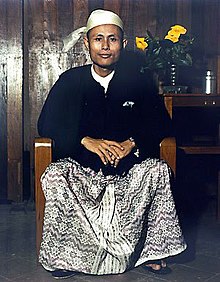
Back أون سان Arabic اون سان ARZ Аун Сан Byelorussian Аун Сан Bulgarian ပိုလ်ႏချုတ်အောင်သန်း BLK অং সান Bengali/Bangla Aung San Catalan Aun Schan Czech Aung San Danish Aung San German
Aung San | |
|---|---|
အောင်ဆန်း | |
 Aung San c. 1940s | |
| Deputy Chairman of the Governor´s Executive Council; Counsellor for Defence of British Burma | |
| In office 28 September 1946 – 19 July 1947 | |
| Preceded by | Sir John Wise |
| Succeeded by | Office abolished U Nu as Prime Minister |
| Deputy Prime Minister and Minister of War of the State of Burma | |
| In office 1 August 1943 – 27 March 1945 | |
| Preceded by | Office created |
| Succeeded by | Office abolished |
| President of the Anti-Fascist People's Freedom League | |
| In office 27 March 1945 – 19 July 1947 | |
| Preceded by | Office created |
| Succeeded by | U Nu |
| General Secretary of Communist Party of Burma | |
| In office 15 August 1939 – 1940 | |
| Preceded by | Office created |
| Succeeded by | Thakin Soe |
| Personal details | |
| Born | Htein Lin 13 February 1915 Natmauk, Magwe, British Raj |
| Died | 19 July 1947 (aged 32) Rangoon, British Burma |
| Manner of death | Assassination |
| Resting place | Martyrs' Mausoleum, Myanmar |
| Political party | |
| Spouse | |
| Children | 4, including Aung San Oo and Aung San Suu Kyi |
| Relatives |
|
| Alma mater | Rangoon University |
| Occupation | Politician, soldier |
| Known for | His work towards Burmese independence and the establishment of the Tatmadaw |
| Signature | |
| Military service | |
| Allegiance | |
| Rank | Major general (highest rank in military at that time) |
Aung San (Burmese: ဗိုလ်ချုပ် အောင်ဆန်း; MLCTS: aung hcan:, pronounced [àʊɰ̃ sʰáɰ̃]; 13 February 1915 – 19 July 1947) was a Burmese politician, independence activist and revolutionary. He was instrumental in Myanmar's struggle for independence from British rule, but he was assassinated just six months before his goal was realized. Aung San is considered the founder of modern-day Myanmar and the Tatmadaw (the country's armed forces), and is commonly referred to by the titles "Father of the Nation", "Father of Independence", and "Father of the Tatmadaw".
Devoted to ending British Colonial rule in Burma, Aung San founded or was closely associated with many Burmese political groups and movements and explored various schools of political thought throughout his life. He was a life-long anti-imperialist and studied socialism as a student. In his first year of university he was elected to the executive committee of the Rangoon University Students' Union and served as the editor of its newspaper. He joined the Thakin Society in 1938 and served as its general secretary. He also helped establish the Communist Party of Burma in 1939 but quit shortly afterwards due to vehement disagreements with the rest of the party leadership. He subsequently co-founded the People's Revolutionary Party (later the Burma Socialist Party) with the primary goal of Burmese independence from the British.
Shortly before the outbreak of World War II, Aung San fled Burma and went to China to solicit foreign support for Burmese independence. During the Japanese occupation of Burma, he served as the minister of war in the Japan-backed State of Burma led by Dr. Ba Maw. As the tide turned against Japan, he switched sides and merged his forces with the Allies to fight against the Japanese. After World War II, he negotiated Burmese independence from Britain in the Aung San-Attlee agreement. He served as the 5th Premier of the British Crown Colony of Burma from 1946 to 1947. He led his party, the Anti-Fascist People's Freedom League, to victory in the 1947 Burmese general election, but he and most of his cabinet were assassinated shortly before the country became independent.
Aung San's daughter, Aung San Suu Kyi, is a stateswoman, politician, and Nobel Peace Prize laureate. She was Burma's State Counsellor and its 20th (and first female) Minister of Foreign Affairs in Win Myint's Cabinet until the 2021 Myanmar coup d'état.
© MMXXIII Rich X Search. We shall prevail. All rights reserved. Rich X Search